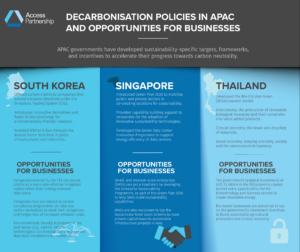

Which APAC markets are bucking the sustainability trend?
Recent negotiations at the United Nations Climate Change Conference (COP26) in November 2021 culminated in the adoption of the Glasgow Climate Pact. The pact involves moving toward more ambitious commitments to lower emissions, increase climate-based financial payments to developing countries, and to develop better rules for global carbon markets.
In the Asia Pacific (APAC), governments are catching up to accelerate their transitions to cleaner energy sources. Faced with the challenge of moving away from reliance on fossil fuels, many of the APAC countries are looking to the private sector to achieve their net-zero goals.
Let’s take a look at some of the decarbonisation policies in APAC:
Korea: Launched in 2015, the Korean Emissions Trading System (ETS) is the second-largest carbon market after the EU. Operating on cap-and-trade principles, the government limits each company’s annual emissions. Emissions beyond the allocated amount require companies to purchase carbon credits. Market stabilisation measures are also implemented to prevent significant price volatility in the ETS. For instance, the oversupply of allowances in the ETS caused by the pandemic led to the government’s intervention by setting a temporary price floor. The government has also sought to meet the rising investor demand for carbon trading by expanding participation to third parties, including financial investment companies and private investors. Carbon emission derivatives and carbon credit-themed exchange-traded funds will be introduced in Korea Exchange. Beyond carbon trading, the government also introduced the Korean Green New Deal in 2020 to invest USD 61 billion in green infrastructures, renewable energy, and green industries to achieve carbon neutrality by 2050. Interestingly, the government also plans to expand its supply of electric and hydrogen vehicles to promote distributed energy production and eco-friendly travel.
Opportunities for businesses: Companies covered by the ETS can source credits as a more cost-effective mitigation option rather than making emission reductions. Companies subject to carbon compliance programmes can also use carbon derivatives to meet their obligations and hedge risks of increased emission costs or carbon prices. The Korean Green New Deal also offers opportunities for market entry, especially for environmentally friendly businesses in the tech sector (e.g., electric vehicle technologies).
Singapore: The government has adopted a comprehensive national approach to enhance Singapore’s economic, climate, and resource resilience while creating new business opportunities. Known as the Green Plan 2030, the government has set out initiatives to mobilise the public and private sectors to co-create solutions for sustainability. Support is intended to help companies build capabilities in the green economy, including the development and commercialisation of innovative solutions for sustainability. New technologies for carbon capture, utilisation, and storage would be key to strengthening climate resilience. The Green Plan also hopes to explore the potential of low-carbon hydrogen and other emerging technology pathways and modelling for decarbonisation. To balance environmental sustainability with infrastructure development, the government also recently imposed a moratorium in 2019 on the building of new data centres due to the intensive consumption of electricity and water. This has, however, inadvertently hampered the growth of the digital economy as many cloud solutions still require servers at the end of the day.
Opportunities for businesses: Small- and medium-sized enterprises (SMEs) can get a head start by riding on the incentives afforded by public sector programmes, notably the Enterprise Sustainability
Programme, as part of the Green Plan 2030 to build sustainability capabilities in the private sector. More partnerships can be explored with the public sector to help SMEs incorporate green projects in their corporate social responsibility practices.
Thailand: The government has taken gradual steps to move towards renewable energy while depending heavily on the private sector for innovations. Apart from the latest power development plan to increase renewable energy to 30% by 2037, the government has developed the Bio-Circular-Green (BCG) economic model (2021 to 2026), driven by technologies to transform the nation into a value-based and innovation-driven economy. Recently, the Thailand Board of Investment approved incentives to encourage companies to reduce emissions and participate in the development of the BCG economic model. In the renewable energy sector, public-private partnerships are formed to tap into innovative technologies. Interestingly, the Thai Metropolitan Electricity Authority partnered with an Australian blockchain company, Power Ledger, and a Thai renewable energy business, BCPG, to develop a solar power project. These initiatives align with the Thailand 4.0 strategy to promote a digital economy, emphasising private investments and environmentally friendly businesses.
Opportunities for businesses: The government’s targeted investments of USD 23 billion in the BCG economy implies more opportunities for the biotechnology and biomass market to create renewable energy. Bio-based businesses in agriculture, medical and healthcare, and biochemicals are welcome to tap on the government’s investment incentives to boost sustainable agricultural production and circular economy.
In Summary:


Subscribe to our news alerts here.